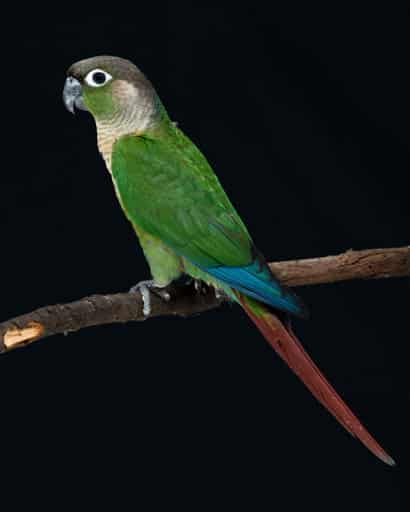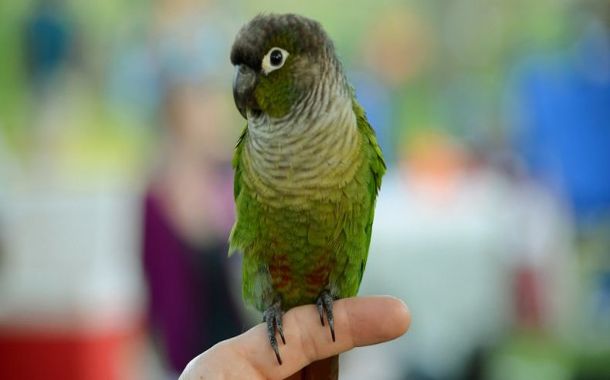How Much Does a Green Cheek Conure Cost?
Last Updated on April 24, 2024
Written by CPA Alec Pow | Content Reviewed by ![]() CFA Alexander Popinker
CFA Alexander Popinker
With their vibrant green feathers, clownish antics, and talking abilities, green cheek conures have become hugely popular companion birds over the past few decades. But before bringing one of these feisty little parrots home, it’s important to fully understand the extensive commitment involved.
In this guide, we’ll provide in-depth analysis of the costs and responsibilities of properly caring for a green cheek conure. You’ll learn about typical purchase prices, recurring food and medical expenses, housing and enrichment needs, unexpected veterinary costs, handling techniques, and training requirements. We’ll also discuss essential considerations around conure behavior and lifespan to set realistic expectations before acquiring your new family member.
Equipped with clear insights into the budgetary and lifestyle demands, you can make the most informed choice possible while still reaping the rewards of bringing home one of these endearingly comical yet vocal companions.
How Much Does a Green Cheek Conure Cost?
The cost of a Green Cheek Conure ranges from $400 to $1,200, with smaller hobby breeders charging $400 – $600 and rare color mutations fetching higher prices of $800 – $1,200.
Since green cheek conures are primarily bred domestically as pets, purchase prices largely depend upon factors like:
- Age: Babies under 1 year old command the highest pricing, while adult green cheeks over 5 years often cost less.
- Breeder Size and Experience: Smaller hobby breeders charge $400 – $600, while large reputable breeders command $600 – $1,000. Avoid big commercial bird mills.
- Rare Color Mutations: Unique variants like pineapples, turquoise, cinnamon, and yellow-sided fetch higher pricing from $800 – $1,200.
- Geography: Prices vary based on regional supply and demand. Coastal urban areas often have higher prices.
When sourcing a green cheek conure, always prioritize experienced breeders focused on bird health, proper socializing, and genetic diversity over mass producers or least expensive options.
The Bird Breeders website lists various prices for Green Cheek Conures from different breeders, ranging from $299 to $950.
Green Cheek Conures are priced at $899.99 in-store at Petco in Longmont.
The prices for Green Cheek Conures at PetSmart may vary, with specific pricing not provided on the website.
Baby Green Cheek Conures are available for $375 on the Parrot Stars website.
The Pineapple Green Cheek Conure Parrot is priced at $599.99 on the Golden Cockatoo website.
Adoption – A Great Alternative
For those looking to reduce purchase costs, adopting an adult green cheek from a bird rescue often ranges from $75 to $200 for the adoption fee. The incentive beyond cost savings is providing a deserving bird a forever home. Be prepared to cover any medical treatment needed.
Overview of the Green Cheek Conure
Green cheek conures are small, vibrantly colored parrots native to the forests and woodlands of Bolivia, Brazil and Paraguay in South America. Weighing just 80-100 grams, these pint-sized parrots pack huge personalities into a tiny body.
Green cheeks are highly intelligent and social birds. They form tight bonds with their owners and fellow bird friends. Green cheeks stay playful and curious even into maturity, delighting owners with their antics and clownish behaviors. With consistent positive reinforcement training techniques, they can even learn to mimic words, tunes, and household sounds.
But prospective owners should also be prepared for the loud ear-piercing screeches green cheeks frequently emit as a form of natural vocal communication. Their extreme noise levels demand careful consideration.
Overall, green cheek conures can make entertaining and deeply bonded pets for attentive owners able to accommodate their specialized care needs.
Initial Costs for First-Time Owners
Expect around $500 to $1,000 in initial costs when first bringing home your green cheek conure:
- Spacious Cage: $150 to $500 for adequate size
- Perches, Toys, Bowls: $50 to $150 for essential accessories
- Food and Supplements: $20 to $50 to stock up initially
- Vet Check-up and Exam: $75 to $150 for health assessment
Shopping sales and reputable secondhand sources helps reduce initial outlays on needed supplies. But always buy new when it comes to your bird’s main cage and food bowls to ensure cleanliness.
Recurring Costs of Green Cheek Conure Care
Annual costs for caring for a green cheek conure generally total $500 to $1,000. Major recurring expenses include:
- High Quality Diet: $200 to $400 annually
- Toys: $75 to $150 for new enrichment
- Vet Visits: $100 to $200 for exams, lab work, vaccines
- Grooming Supplies: $50 to $100 for nail trimming, bathing
Regular costs ensure your bird stays physically and psychologically engaged, active, and healthy. Never cut corners on food quality or medical care.
You might also like our articles about the cost of other birds like Eclectus parrots, Quaker Parrots, or Indian Ringneck Parrots.
Potential Veterinary and Health Issues
While relatively robust, green cheek conures are still vulnerable to certain illnesses requiring veterinary treatment:
- Respiratory Infections: $100 to $500+ for medications, nebulization, x-rays, bloodwork
- Obesity: $100 to $300+ for consultations, lab tests, prescription diet
- Feather Plucking: $200+ for diagnostics, behavioral therapy, supplements
- Egg Binding: $300+ for emergency surgery, medications, and aftercare
Avian Health Insurance can offset unpredictable vet bills. Expect $15 to $30 in monthly premiums for accident/illness coverage. Wellness plans are also available at higher monthly costs.
Behavioral Training Recommendations
 Investing in proper socialization, bonding, and training improves compliance, minimizes annoying screaming, and reduces nipping or aggression. Recommended expenses include:
Investing in proper socialization, bonding, and training improves compliance, minimizes annoying screaming, and reduces nipping or aggression. Recommended expenses include:
- Private Training Sessions: $50 to $150 per hourlong session
- Clickers and Treats for Positive Reinforcement: $50 to $150
- Foraging Toys to Occupy Time: $5 to $20 per toy
Consulting an avian behavioral specialist provides customized guidance tailored to your bird’s needs.
Legal Considerations and Permitting
Depending on your location, specialized permitting and restrictions may apply to green cheek conure ownership and breeding. Expect permit fees from $25 to $100 where required.
Always diligently research your region’s exotic pet regulations before acquiring a green cheek conure to ensure compliance. Restrictions aim to protect bird welfare.
Final Words
Green cheek conures often live 10-15+ years with proper diet, housing, mental engagement, and regular veterinary care. Some even reach 20-30 years. Over such a long life, expenses for food, toys, cages, check-ups, grooming and unforeseen medical needs can easily exceed $10,000+.
Budgeting $500 to $2,000+ annually covers costs to keep your bird healthy and thriving. But prospective owners must carefully consider if they can provide the substantial time, energy, and financial commitment caring for a green cheek conure demands before welcoming one into their home.
While not cheap pets, green cheek conures bring immense personality and joy to the right homes ready for their specialized care needs.
Frequently Asked Questions
What to know before buying a green cheek conure?
Research proper handling, noise levels, housing, training techniques, high maintenance needs, veterinary care, and lifespan commitments. Have an avian vet selected and budget planned before adoption.
What does a green cheek conure need?
A roomy cage, variety of perches, grooming supplies, complete diet, foraging toys, routine vet exams, supervised time for exercise and bonding, training, and proper handling are fundamental green cheek care basics.
How do you know if a Green Cheek Conure is happy?
Indicators of good health include sleek, smooth feathers, bright eyes, good appetite, energetic movements and play, readily entering/exiting the cage, singing/chattering, and eagerness to interact with human flock members.



Leave a Reply
Want to join the discussion?Feel free to contribute!